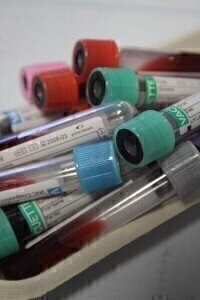News & Views
Trial investigates effects of transfused laboratory grown blood cells in healthy volunteers
Nov 09 2022
For the first time red blood cells grown in the laboratory from donor stem cells have been transfused into another person in the RESTORE randomised controlled clinical trial. If proved safe and effective the manufactured blood cells could provide potential treatments for people with rare blood types, including sickle cell, as well-matched donated blood for these disorders may sometimes prove difficult to obtain.
The RESTORE trial, a joint research initiative by NHS Blood and Transplant (NHSBT) and the University of Bristol alongside other research partners is studying the lifespan of fresh lab grown cells compared with infusions of standard red blood cells from the same donor; the lab cells are expected to perform better than standard donated red cells, which contain populations of varying ages. If the manufactured cells do last longer in the body, it could also reduce the patient’s requirement for transfusions as often, thus reducing potential iron overload.
The trial, which is also being conducted with researchers from the University of Cambridge, Guy’s and St Thomas’ NHS Foundation Trust, National Institute for Health and Care Research (NIHR) Cambridge Clinical Research Facility, as well as Cambridge University Hospitals NHS Foundation Trust, is part-funded by a NIHR grant.
It is the first step towards making lab grown red blood cells available as a future clinical product, initially available for patients with very complex transfusions needs. Two people so far transfused with the lab grown red cells, have been closely monitored and reported as well and healthy with no untoward side effects. The amount of cells being infused varies but is around 5-10mls - about one to two teaspoons.
Stem cell samples were obtained from NHSBT’s blood donor base and grown in a laboratory at NHSBT’s Advanced Therapies Unit in Bristol. The recipients of the blood were recruited from healthy members of the NIHR BioResource. A minimum of 10 participants will receive two mini transfusions at least four months apart, one of standard donated red cells and one of lab grown red cells, to find out whether the younger lab produced cells will last longer than those made in the body.
Professor Ashley Toye, Professor of Cell Biology at the University of Bristol and Director of the NIHR Blood and Transplant Unit in red cell products, said: “This challenging and exciting trial is a huge stepping stone for manufacturing blood from stem cells. This is the first-time lab grown blood from an allogeneic donor has been transfused and we are excited to see how well the cells perform at the end of the clinical trial.”
John James OBE, Chief Executive of the Sickle Cell Society, said:
“This research offers real hope for those difficult to transfuse sickle cell patients who have developed antibodies against most donor blood types.
“However, we should remember that the NHS still needs 250 blood donations every day to treat people with sickle cell and the figure is rising. The need for normal blood donations to provide the vast majority of blood transfusions will remain.
“We strongly encourage people with African and Caribbean heritage to keep registering as blood donors and start giving blood regularly.”
Dr Farrukh Shah, Medical Director of Transfusion for NHS Blood and Transplant, said:
“Patients who need regular or intermittent blood transfusions may [as a] result develop antibodies against minor blood groups which makes it harder to find donor blood which can be transfused without the risk of a potentially life-threatening reaction.
“This world leading research lays the groundwork for the manufacture of red blood cells that can safely be used to transfuse people with disorders like sickle cell.
“The need for normal blood donations to provide the vast majority of blood will remain. But the potential for this work to benefit hard to transfuse patients is very significant.”
More information online
Digital Edition
Lab Asia 31.2 April 2024
April 2024
In This Edition Chromatography Articles - Approaches to troubleshooting an SPE method for the analysis of oligonucleotides (pt i) - High-precision liquid flow processes demand full fluidic c...
View all digital editions
Events
Apr 22 2024 Marrakech, Morroco
Making Pharmaceuticals Exhibition & Conference
Apr 23 2024 Coventry, UK
Apr 23 2024 Kintex, South Korea
Apr 23 2024 Seoul, South Korea
Apr 24 2024 Jakarta, Indonesia








.jpg)









